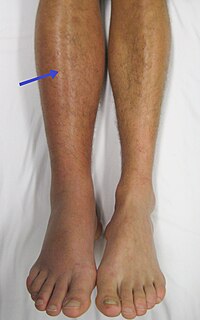
Photo from wikipedia
Venous thromboembolism (VTE) is one of the most common types of cardiovascular diseases (CVDs) and is associated with increased mortality-risk. Poor-self rated health (SHR) has been associated with elevated inflammatory… Click to show full abstract
Venous thromboembolism (VTE) is one of the most common types of cardiovascular diseases (CVDs) and is associated with increased mortality-risk. Poor-self rated health (SHR) has been associated with elevated inflammatory markers and CVDs. However, little is known about as a predictor of incident VTE. To examine the association between self-rated health, lifestyle and incident VTE among middle-aged women. 6917 women aged 50–64 years, followed for 20 years in the Women’s Health In the Lund Area (WHILA) study. After exclusion of those who medicated with anticoagulants, were living in nursing homes or suffered from cancer, stroke, VTE or CHD before baseline, a cohort of 5626 women remained. Cox regression was used to analyse the relationship between self-rated health and time to VTE, censored for any of the previous mentioned diseases during follow-up. Data were collected by questionnaires, physical examinations and Swedish registers. In total, 220 women were affected by VTE corresponding to an incidence rate of 3.9 per 1000 person-years. Adjustment for self-rated health did not significantly predict incident VTE, and neither did any of the lifestyle-related habits (e.g. physical activity and dietary habits including alcohol consumption), besides smoking. This study supports previous results with varicose veins and waist circumference as strong predictors of VTE. Poor self-rated health does not seem to be a valid predictor of VTE. Among lifestyle-related parameters, smoking was significantly associated with risk of VTE. We could also confirm the effect of the other already known risk factors.
Journal Title: Journal of Thrombosis and Thrombolysis
Year Published: 2019
Link to full text (if available)
Share on Social Media: Sign Up to like & get
recommendations!